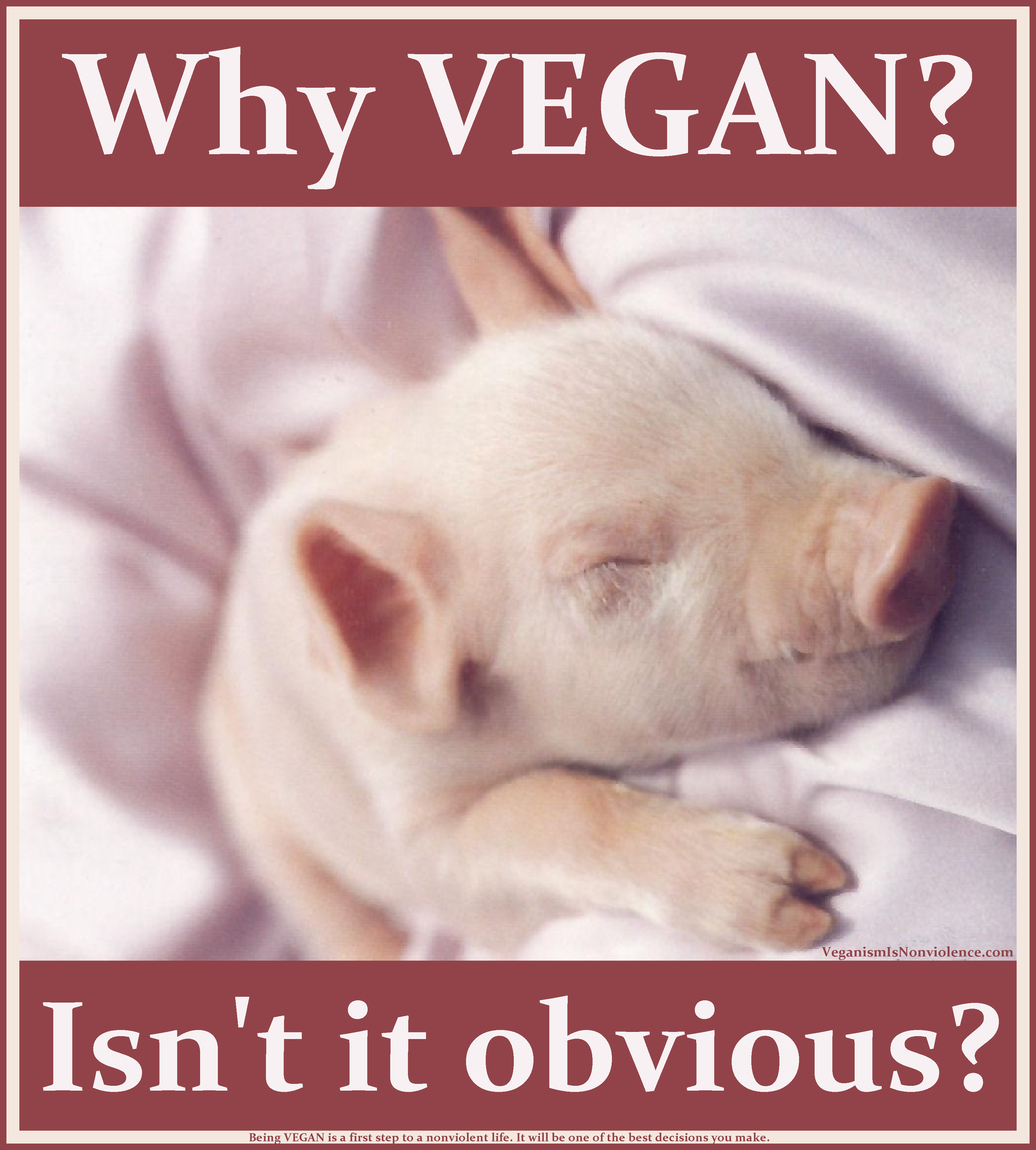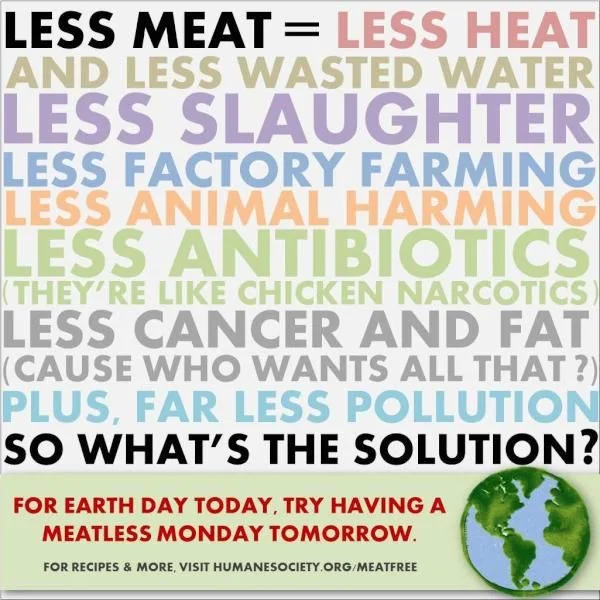Is Your Passion Doing More Harm Than Good? Why Militant Veganism Doesn't Work!
These facts are unvarified, but Compared to animal torture, this image is much more likely to be read - and subsequently concidered.
Whenever someone is passionate enough about an issue to write, protest, advocate or vocalise for it, there is a risk that their passion will impede their ability to be persuasive.
Take any divisive issue where there are multiple groups with contrasting vested interests and (perceived or actual) consequences for all involved. Issues like gender pronouns, religion, politics, parenthood, veganism and mental illness are all appropriate examples, but there are many more.
If you are not careful, discussions on these topics can become quite heated as both sides believe they are right. They can both cite scientific data that supports their claims. Both may suggest cultural, religious and historical precedents that support their view, as well as suggest many anecdotal reasons supporting their point. In addition, both sides can claim that they have a significant proportion of the population behind them.
When two such people meet, and begin discussing a contentious issue, there is a major problem as both groups are significantly invested in their world view and will be unlikely to be persuaded. The discussion devolves into a screaming match, with each side talking over the other person, countering their positions with pre-established narratives and lines of logic.
If this occurs in a public forum as a debate, often supporters of both sides will claim victory. They are observing the issue through an echo chamber of fellow supporters and use debates and arguments as further evidence that they are right.
This sort of discussion may be fine when talking to the ingroup about a particular issue, or in a debate, but when it comes time to try and convince new people to take up your cause, the force of the argument is often overwhelming. There is a risk that the same tactics, arguments and force will be used to convince a new follower as they do to rebuke people in an argument.
In effect, they end up coming on too strong, too fast and use language that is not understandable to people that are not as passionate about the topic as they are. In addition, the change they are pushing may be so far from where reality currently stands that the newcomer may struggle to believe it is possible to change that much – or even potentially revolt against the proposal as it would involve such a significant change to their world.
This can have the effect of driving people away, or even converting them for the opposition.
Take veganism for example. Whilst not all vegans are like this, there are a significant amount of people online and in person that push their world view onto others in a very forceful manner.
From a vegan's perspective, the eating habits of most of society would be abhorrent – effectively akin to the general ambivalence and acceptance of enslaving, torturing and eating a race of people because it is convenient and tastes good. To understand how a vegan may feel, try to imagine a world where human corpses were on display in the meat section of a supermarket, or that the eating of humans was casually discussed multiple times per day in conversation.
The problem comes when these feelings are projected and forced onto unwilling and unsuspecting ears. This is often met with anger, annoyance and confusion.
When I unexpectedly see a video of a slaughter house, caged pigs, tortured fur animals or other traumatic images of this nature, I feel ill. Whilst their content may be a ‘true’ representation of what is happening, forcing them on me in an unexpected manner has the opposite effect to what they person sharing it desires.
Both of these adverts below are pushing the same narrative, but the first one will cause most non vegans to look away in disgust but not change their behaviors. They may not even believe that the conditions are really that bad (those pictures could be set up or just a once off bad situation). At best, these kind of images promote the consumption of free range and ethically sourced meat - as consuming those kinds of meats 'stops' the brutal treatment shown in the image.
The second however points to the simple truth that eating meat involves killing a cute animal. The image is inviting and not repulsive to the eye, yet still tugs at the emotions and does not allow the viewer the emotional out of 'ethical/free range meat'. The pig is still going to die for their food.
Rather than changing my opinion about eating meat, I am just saddened at what is happening and also annoyed at the person that forced it upon me. Often, I will block the person or website that it is from – I don’t want to be exposed to that unwillingly.
Despite being sickened by what I see, I won’t change my behavior. Not because the plight of the animals doesn’t concern me (it does), rather because the tactics that are used to convince me to change are too aggressive. They close off communication. They make me reflexively revolt against any push down that path, mainly because I am anxious about being shown more slaughter or torture.
In addition, what they are asking of me is too extreme. I eat meat and animal products daily, and regularly use animal products for clothing and other purposes. For someone in my shoes, to change to a lifestyle that doesn’t use animals at all is very extreme. I am honestly not sure how to get there from where I am.
I don’t have the knowledge to do so, and I am afraid of asking because I don’t want to be exposed to traumatic imagery or discussions. I am aware that there are many moderates that would be more than happy to talk and share their opinions in a safe and non-judgemental manner, but the extremists have made searching for the moderates risky.
A reasoned & logical argument that I can get behind - following this advice is a step towards veganism.
A more convincing approach would be to attempt to understand where the person you are trying to convince is at and then move them towards your goal from there. One small step at a time. For me, that may involve me cutting meat consumption to once per day, or having meat free days. Whilst this is not veganism, it a small step towards it.
Once I have learnt to adapt to a meat free day, maybe push it to two days per week and so on. Small incremental changes are not as intimidating as a large quick change. In addition, I would be likely to stick to it – habits take a while to break and reform. It won’t be as quick as you would like, and potentially I may never become a full-fledged vegan, but I will be closer to the goal then I am now.
For every issue that you are passionate about, I would suggest the following:
- If you want to convince people of something, it is important to get down to their level and see the world through their eyes. Work out where they are coming from and what they believe. Once you know where they are at, you can begin to encourage them in a particular direction.
- It is important to go slowly and speak carefully. Try to avoid scare tactics or shock campaigns as this approach may cause the listener to close themselves off to you or even your cause.
- Be willing to answer their questions, even the ones that seem obvious or insulting. If they are asking questions in earnest, it means they are interested. If you get offended, annoyed or insinuate that the other person is stupid, you will lose them. They don’t have your knowledge and as such may be lacking some specific piece of vital information that you take for granted eg: “If I don’t eat meat, where will I get my protein from?”.
- Avoid insults, put downs or suggestions of barbarism. It is important to realise that just because you believe that a behavior is abhorrent, they may think that is completely normal. If you insult that behavior, people will sooner get defensive than change their minds. They will believe themselves before they believe you.
- Be patient, changes take time and the person you are trying to convince may relapse into their old ways. If this happens don’t chastise or judge them, they are only human. Instead be there to talk to, offer advice and admit where you have relapsed and what helped you through it.
- Realise that although the issue is very important to you and is at the forefront of your mind, it is not that way for others. If you keep that in mind when communicating about your passion, you won’t be as overwhelming to the uninitiated.
To be clear, I find it amazing that there are so many passionate people out there pushing their agendas, promoting their causes and striving to make changes to the world. I fully encourage this behavior, because without it there would be no social progress or really much in the way of ethical development at all.
If you have a passion, please don’t be discouraged by a lack of progress. Although it can take a lot of time, these movements do have real world consequences that have impacted us all, and made our world more accepting and livable.
I won’t lie, I am one of these people. My cause is mental health advocacy. Ideally, I would like to see a stigma free world where people with mental illness are understood and not unfairly judged or looked down upon. A world where people can talk about their mental concerns without fear of reprisal. To promote this cause, I write about mental health issues, self-harm, suicide and traumatic childhood experiences.
In all honesty, I hope that I can take my own advice when it comes to this. I would hate to see my passion negatively impacting a cause that I see as so important.
Zachary Phillips
*Thank you to those vegans and vegetarians that are currently in my life who are willing to answer my questions and accept me for who I am. Your advice is slowly impacting me and I am very grateful for that.
Support this blog on Patreon
Check out this related blog post: Why You are Trapped In An Echo Chamber - On Feminism & Men’s Rights Activism
Check out this related podcast episode: On Travel, Reading and Expanding Your Mind





